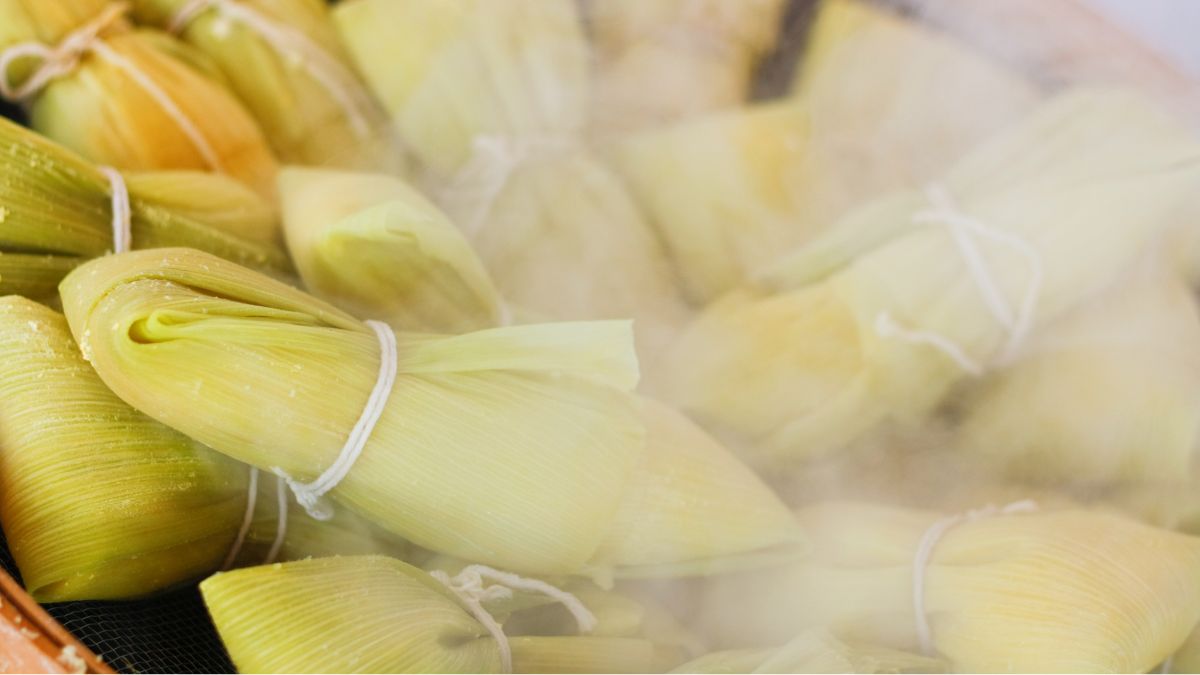Why Are Your Tamales Taking so Long to Cook?


Long cooking time is the prime reason why tamales are usually made on special occasions. The good thing is you can make loads of them and keep them frozen. That way, you’ll need a half hour to make Mexican delicacy for your family. Tamales are as easy as pie dishes, with a handful of ingredients in their composition. So, you’ll probably ask: Why are your tamales taking so long to cook?
Tamales take a long to be ready because they are steamed. Steaming on low heat makes them firm and moist at the same time. But, if you overcook them, they will be soggy. They can be up for it faster, of course, by using a pressure cooker.
You don’t have to avoid trying homemade tamales anymore. I promise they aren’t hard to prepare at all. Just follow a few tips listed below and you’re good to go. Find answers to the most common questions: how long it takes to fully cook, how to know when it’s ready, and most importantly, how to fix it if you mess it up.
How Long do Tamales to Fully Cook?
There is no universal answer on how long the cooking of tamales takes as it depends on numerous reasons. Once you pick up some tricks here and there, you’ll be able to estimate how to cook them. Let’s take a glimpse at a few situations.
Whether you’ll going to cook tamales a half an hour or a couple of hours more, depends on the size of your pot, the number of tamales, the filling, and many more. If you decide to make tamales from scratch, you’ll need at least 2 hours of cooking time.
The secret of perfectly prepared tamales is steaming. Traditionally, cooks used pots with strainers on a stovetop. Nowadays, instant pots and pressure cookers are more popular as they shorten cooking time.
For homemade tamales steamed on a stove, you’ll need a minimum of 1 ½ to 2 hours. Cooking can last up to 6 hours sometimes if you’re cooking it at a low temperature and there are loads of tamales in a pot. In a slow cooker, you have to boil them for at least 4 hours. If you have half-cooked pre-made frozen tamales, preparing will take about 30 minutes to 45 if you have lots of them.
The tip for faster cooking is always the same: don’t overcrowd the pot. You’ll want to leave enough space in between tamales for airflow. It’s important because otherwise, tamales won’t cook evenly, and it will take ages to be ready.
The next major thing is the lid. If you don’t close the lid properly, steaming won’t be as good because part of the hot air will steam out of the pot. Cooking on residual hot air will result in poorly cooked tamales.
If you don’t have a pot that closes tightly, don’t worry, here’s a little trick to save the day. Take a piece of aluminum foil, cover the pot, pierce a little hole in the middle, and close the lid regularly. That way, you’ll secure the necessary flow of air.
Instant pot and pressure cooker are pretty much the same, but instant pot is a more secure solution. They work on the identical principle, as the high pressure quickens prep time. For optimally crowded pots and high pressure, tamales will be ready in about 30 minutes.
When it comes to sorting tamales in the pot, place them upright. That position will promise you evenly cooked dough. Don’t forget to turn the closed-side-down which prevents the filling from trickling.
For tamales to cook fully, water has to boil all the time. Here are some inputs you should be aware of. Firstly, water shouldn’t boil too heartily. The best solution is to cook it on medium or low heat if you have a lot of time.
To ensure water is constantly boiling, put a spoon in the pot. The rattling will let you know how vigorous boiling is and if it stops. Plus, putting some corn husks on the bottom of the sieve will still allow the airflow but prevent water from coming in touch with the tamales. Tamales won’t steam faster and better with more water. They require only a glass or two to maintain steam flow.
How to Know When Tamales Are Cooked?
Estimating tamales can be a little tricky. Here are the ways your tamales won’t ever be under or overcooked. Let’s dig in.
The first and most obvious trick is poking them with a toothpick. If a toothpick comes out clean, with no masa crumbs on it, it’s ready. If that’s not the case, leave them on the stove a bit more.
In a condition when you’re cooking tamales for a long time, and there is still residual masa on a toothpick, think about the dough. You may put too much shortening or lid in the masa. It doesn’t mean it’s uncooked but too greasy.
The second thing is texture. When cooking, masa will stiff and be solid to the touch. But also, when hot, masa will feel soft and it will be harder to estimate if it’s undercooked. With other options at your service, you shouldn’t stress about this one, especially if you’re a tamales-making beginner.
Furthermore, when cooking masa and filling will become darker in color. Also, cooked tamales blow off the aroma. Those are all little signs, but with them, you can never be 100% sure. They are still good to know, though.
The most secure option among all is tasting. Take one tamale out and see if it will unwrap easily. Well-cooked tamale will just slide out of the husk and leave no trace in it.
Plus thing to consider is waiting for it to cool a bit. When you unwrap the boiling tamale, it will stick to the husk, and you’ll think it’s undercooked. Wait for a couple of minutes and unpack it; if it’s still sticky, cook it more.
When chewing ready-to-eat tamales, they won’t dissolve. You will feel every component, both masa, and filling. Masa will be firm around the well-evaporated sauce.
What Happens if You Cook Tamales for Too Long?
Overcooked tamales are dry on the inside and soggy on the outside. That combination is highly unwanted. After cooling masa will be leathery and hard to chew, while filling will be stale and granular.
When you dig in the tamale that is overcooked, it will fall apart. Its sogginess will make it bland and unpleasant to eat. Besides, it will be mushy around the filling. If it’s slow-cooked for a long time, the meat in the filling can be too soft and sodden.
How to Fix Overcooked Tamales?
People love tamales for their signature texture. So, when you ruin that, their taste won’t be even close to what you wanted. But even if that happens, don’t let the disappointment creep in because everything can be fixed.
As said before, overly steamed tamales are soggy. You will want to put them on a paper towel to absorb as much water as they can. After that, put them on a baking sheet and toss them in the oven.
Preheat the oven to 350 degrees and bake them for about 10 minutes. That should be enough for the water to evaporate and the masa to become firm and a bit crispy again. Another more caloric tip is to dip tamales in egg, flour, and bread crumbs. The flour will dry up the masa and frying will make them crunchy on the outside.
